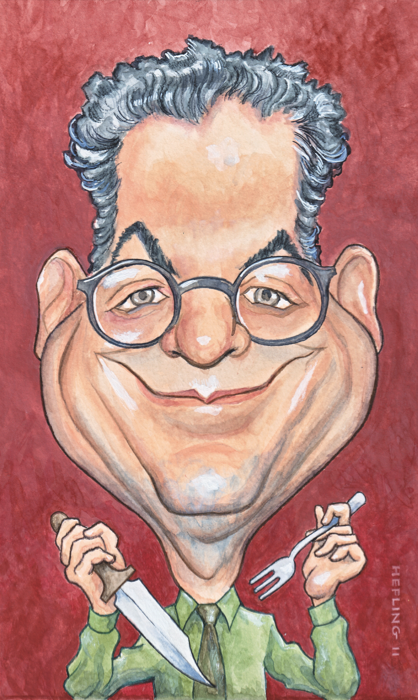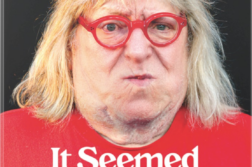Celebrity culture vultures have long devoured the words of Michael Musto, the storied dish artist who has served up the otherwise  unreported dimension of the famous for over two decades in his Village Voice column. Notably uninhibited about reporting on where celebrities sit on the Kinsey Scale, Musto has long taken shots at the mainstream media for their squeamishness about doing just that. In addition to his column, Musto now blogs incessantly and is a considerable media presence, appearing regularly on Rachel Maddow’s MSNBC show while also contributing articles to gay outlets like Out and The Advocate.
unreported dimension of the famous for over two decades in his Village Voice column. Notably uninhibited about reporting on where celebrities sit on the Kinsey Scale, Musto has long taken shots at the mainstream media for their squeamishness about doing just that. In addition to his column, Musto now blogs incessantly and is a considerable media presence, appearing regularly on Rachel Maddow’s MSNBC show while also contributing articles to gay outlets like Out and The Advocate.
In his fourth book, Fork on the Left, Knife in the Back (Vantage Point), Musto rants about the celebrity culture to which he has harnessed his career, waxing philosophical on everyone from Grace Jones and Madonna to Sarah Silverman and Lindsay Lohan. And it receives a ringing endorsement from none other than fellow traveler in gossip Joan Rivers, who calls Musto “a genius.”
I spoke with Michael Musto by phone from New York last October.
Matthew Hays: What first led you to journalism?
Michael Musto: I’m an only child and barely spoke through my entire childhood, but I found a catharsis by going to the movies and writing little reviews for myself on index cards. I also would gab and gossip on the front stoop during the summer, opening up with family members and neighbors by dishing away about all the other family members and neighbors. By the time I wrote for the school paper, it became clear that this was my calling—especially since I could also go on TV and fulfill my other love, performing. I never thought there’d be a job that would combine all of my cravings: writing, dishing, being openly gay, and performing. I’ve found it, and I’m not letting go!
MH: How did the Village Voice column come about?
MM: I had written some pieces for the Voice, so I already had an in there. When my predecessor sadly passed away, I waited a respectful amount of time, then asked my editor, Karen Durbin, if they’d consider me as a replacement. I never thought anything would come of it, but sure enough, she contacted me and asked me to submit a sample column. Basically, I was going to audition—along with other viable candidates—which was a really solid way to approach this. It was like a journalistic version of A Chorus Line. And to make it even more professional, they actually paid for the sample! I turned in a whirlwind column covering movies, theater, nightlife, and media—all done with my characteristic sardonic humor and segues—and that was it. I got the job, having convinced them that I was in the middle of many scenes and could make sense out of them for an interested readership. I immediately asked what I should do with the column, and they pretty much said, “Whatever you want”—within reason, of course. That freed me to explore my voice and really have fun without a lot of the usual limits.
MH: Why is it that gay men have such a strong connection to celebrity dish?
MM: Gays have long been the oppressed, the outcasts, the scapegoats. So we’ve always bonded by being a bit catty, bitching about the types that shut us out—whether it be the football captain and cheerleader from school or the perfect looking but bland movie stars who need to be brought down a notch. Gossip has always been a way to deflect from our own pain by immersing ourselves in others’ problems, but it’s also been a way to get attention for being informed, snappy, and funny about things.
MH: What’s the main way that the Internet has changed celebrity gossip?
MM: The Internet has made everything immediate and accessible. No longer do you have to wait for a weekly magazine or daily paper to get your gossip fix, or even for your evening’s entertainment show. You get it right away with a stroke of the fingertips, and it’s available in endless assortments because everyone on earth has a blog, a Facebook page, or comments on other people’s blogs and Facebook pages. So, while I used to compete with a handful of people, I’m now competing with everyone on the planet! And that’s good—it means there’s more access to information, there’s less squeamishness about covering controversial subjects, and everyone feels more informed than ever because of the availability of dish and all the varying takes on it. It also forces me to be more on my toes than ever in order to stay special, but that’s fine because my style is fairly inimitable. And when the Internet breeds gossip that’s too hateful and nasty, I actually come off classy in comparison!
MH: Why do you think the mainstream press was so reluctant for such a long
time to report on someone who’s known
to be gay?
MM: They still are! They always stop short of that sort of thing because of career concerns for the actors. But consider that out figures like Neil Patrick Harris, Cheyenne Jackson, Rosie O’Donnell, Ellen DeGeneres, and Rachel Maddow have soared. Also, the same scribes who balk at reporting that someone’s gay think nothing of reporting drug addictions, out-of-wedlock babies, cheating scandals, and bad movies. It’s all so conflicted, and I think it actually stems from the reporters projecting their own deep-down biases. They were raised to think that calling someone gay is a smear, and somehow they can’t let go of that feeling, convinced that they should pander to the homophobes out there by keeping gayness a secret. But the Internet has helped level the playing field, and eventually saying a public figure is gay will be as natural as saying they’re Irish or blonde.
MH: Have you had any contact with Rosie or Ellen since the outing controversies and perceived spats you were having with them?
MM: After the whole Ellen business, I did a nice piece on Anne Heche (when she was living with Ellen). Anne left a message on my machine thanking me and she handed the phone to Ellen, who said some nice words, too. That was never a spat. When I supposedly outed Ellen, she’d been making out with Anne in lesbian bars! I was basically saying, “Why is the media shying away from reporting this?” Similarly, big magazine profiles would portray Rosie as a single mother without mentioning her love life at all. I was as mad at the media as I was at Rosie for going along with this. But after it all played out, she came out with a vengeance and made us proud. And I love her new talk show. Years ago, there was a press meet-and-greet for Taboo [the Broadway show she produced], and in the midst of speaking to the assembled, she smilingly said, “Michael Musto, you keep looking away whenever I look at you!” I actually do that with everyone, but her saying that broke the ice, and we’ve been friends ever since.
MH: The Internet appears to be destroying journalism as we know it. Do you see a silver lining?
MM: The Internet is journalism. It’s not destroying it any more than TV destroyed movies. It’s just a different venue for the same thing. And frankly, it makes it way easier to do journalism—i.e., to track down sources, quotes, and information, and also to shoot your work out there so more people read it.
But I also believe in the great power of print journalism, so I do a weekly column in the paper (which also appears on-line) as well as blog all day. I’m out there in every popular medium. The quick bites that the Internet seems to favor can be annoyingly tailored to the ADD generation, but if anyone has a good, long piece in them, there’s room for that, too. The Internet is infinite and will only be as good as what we make it. I look forward to seeing how people—like myself—will fill all that empty space.
Matthew Hays, author of The View From Here: Conversations with Gay and Lesbian Filmmakers, teaches journalism and film studies at Concordia University in Montreal.




